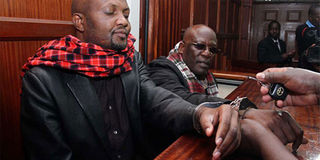Arriving at the future our country so badly needs

Gatundu South MP Moses Kuria(left) and Former Machakos Senator Johnstone Muthama at Milimani Law Courts in Nairobi on September 12,2017 on allegations of hate speech. PHOTO | EVANS HABIL | NATION MEDIA GROUP
What you need to know:
How is it that, even after another century of positive improvements in international communication, Kenya’s highest law-making organ still contains so many mental Neanderthals?
What is education if it does not tend to train the mind towards enfolding human beings of all good kinds as members of your own household?
Every clear minded politician knows that, for Kenya to arrive at the future it so needs, there is only one way, namely, national unity of efforts.
Probably the most important knowledge that good education can provide to each individual is the discovery that, objectively, all human individuals of all races and all tribes are your own brothers and sisters.
That is why, if he lives to be a hundred (as I hope he may), even Moses Kuria might one day learn that the Luo – his present pet-peeves – are his own first cousins.
No, Mr Kuria is not the only anti-Luo individual among Kenya’s non-Luo male politicians. I say male because, as for females, a profusion of Kikuyu, Kisii, Kuria and Luhya women are married to Luo men, many of them blissfully.
That, I say, is an excellent trend because it means that a time is coming when the line between any two ethnic communities will have been blurred into total insignificance.
WORKING CLOSELY
That is one of the facts that should always motivate all Kenyans – especially their political and religious leaders – into working closely and carefully together to cultivate excellent inter-ethnic and inter-racial neighbourliness.
It is the only way in which we can arrive fully at that single nationhood which once was what motivated our founding fathers and mothers into declaring a liberation war on British colonialism.
For the simple fact is that, thanks to inter-ethnic marriages, every Luo, for instance, now has cherished relatives among, say, the Kalenjin of the Rift Valley, Uhuru Kenyatta’s noted Mount Kenya communities, and the Mijikenda peoples of the Indian Ocean littoral and archipelagos.
As years flow by, it becomes increasingly visible that a time is approaching apace when, thanks to inter-ethnic and inter-racial marriages, Kenya will one day become just one tribe.
ETHNIC FILTH
It is for umpteen reasons, then, that I purr like a cat whenever I imagine the advent of that future day. Yet though Mr Kuria never opens his mouth without pouring out the smelliest, most hate-ridden, ethnic filth, he is the Member of Parliament for a constituency once represented by none other than Mzee Jomo Kenyatta himself, our founding father and great exemplar in nationhood.
The question is: Did Mr Kuria ever go to any school in which even the rudiments of inter-personal, inter-ethnic, inter-racial and inter-sectarian respect was taught?
How is it that, even after another century of positive improvements in international communication, Kenya’s highest law-making organ still contains so many mental Neanderthals?
How is it that so many Kenyans retain thoughts and feelings that seem to drive all of us inexorably into pouring out of the mouth such a profusion of filth, the most vehement ethnic atavism you can imagine from a so-called educated person and leader?
EDUCATION
What is education if it does not tend to train the mind towards enfolding human beings of all good kinds as members of your own household?
But only knowledge of that kind – only the sort of education that expels from the minds of children all the falsities that parents of every ethnic community pour into the extremely receptive minds of its children against other ethnic communities – only good education can rescue our communities from their present free fall into atavistic chaos.
Exactly what do you gain, Mr Kuria, both for the ethnic community about which you are so vehement and for the nation as a whole, by spending all your working day sowing the seeds of ethnic discord and national distrust?
Why do you find it impossible to think of Kenyans as one community which must work in unity if it is to achieve its communal desires as soon as can be?
Why do you find it so difficult to see that, as long as Kenyans scatter their efforts into narrow ethnic pigeonholes, we shall never arrive at our destination?
Every clear minded politician knows that, for Kenya to arrive at the future it so needs, there is only one way, namely, national unity of efforts.





